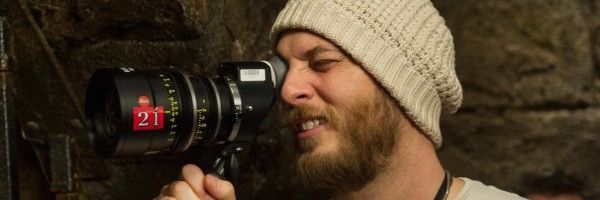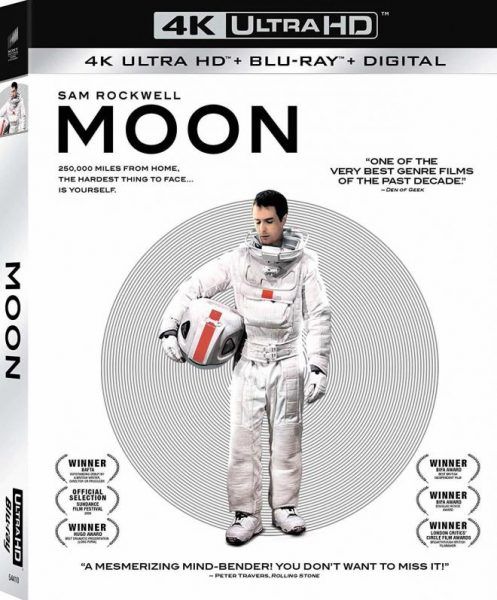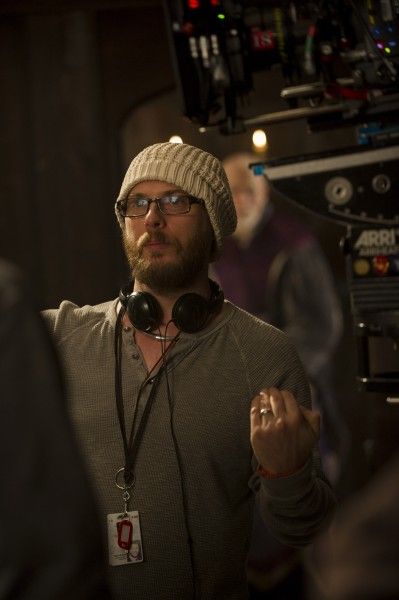It’s been ten years since Duncan Jones burst on the scene with one of the best sci-fi films of the 2000s, Moon. The story follows a human worker on Mars who makes a shocking discovery that throws his entire identity into doubt. It was smart, confident sci-fi with an excellent performance from Sam Rockwell. It holds up wonderfully and now the film has come to 4K.
To mark the release of Moon on 4K, I got to do a phone interview with Jones. During our conversation, we talked about his memories of Moon, the film’s impact, the freedom he had to make Mute for Netflix, what his Warcraft trilogy would have looked like had it gone forward, his upcoming project Rogue Trooper, and more.
Check out the full interview below. Moon is now available on 4K.
What's it feel like to look back at Moon ten years later?
DUNCAN JONES: It's crazy, that I've now made movies for ten years. It's my first re-watching though. My God now. Now I can actually say that I have a career making movies, because I've been taking that long enough that I'm having a 10th anniversary.
When you look back at Moon, is there any particular moment from filming that really jumps out at you? Something that still stands out above everything else.
JONES: I mean, I think the first movie is always going to feel very special. You know, we made the movie and stuff in studio which chose this industrious history and I had put up videos and commercials, before. The fact that we were able to make a success of it and take it to Sundance and actually get the film released. It's always going to be a unique experience and it's all good.
With the release of this 4k did you oversee that transfer or is that just something that's happening on the studio's end?
JONES: I think the process that will be used, obviously there's a lot of technical side of it which gets done without me but then I'm able to actually see the final result. Give notes. I made some tweaks to it here and there so I was certainly involved, I think the transfer was beautiful. We shot it on 35 film. Most of the film we were able to sort of transfer and get the get the level of detail we wanted. A lot of visual effects work was done, kind of the post work, but you know, it couldn't be really done without it.
Is there anything that you know now after having done this, making feature film for 10 years that you know now, that you wish you had known when making Moon?
JONES: I don't know. We put our body and soul into making that movie. I don't think I could have put any more of myself into that movie than I did and, I think maybe in some ways the naivety and the innocence of us going into that film is probably one of the only reasons we were able to survive it. I think if we'd known how exhausting it was going to be maybe we would've been a little less ambitious.
What's interesting about your early sci-fi between Moon and Source Code is that they’ve sort of reoccurred like the twist in Moon reappears in Oblivion or the sort of Groundhog Day kind of storytelling has become even more prominent in the years since Source Code. Has it been interesting to sort of see these ideas keep coming back in other films and TV shows for that matter?
JONES: I guess, I mean it's always kind of fun to spot where maybe you had an influence on something else that gets made. I think I will have done God's work if more people cast Paul Rudd as a villain [like he was in Mute].
I agree with that. Since you mentioned Mute, I was curious if Netflix shares how that film performs with you or is it just, it goes onto their service and it's just good to have it done?
JONES: I think, for me, it was all about getting the opportunity to make that movie. Because I always, from the very start, I knew that was a difficult piece of storytelling to justify as a commercial enterprise. It's a hard story. It's difficult subject matter. I'm incredibly grateful that Netflix gave us the opportunity to make it, because it was just one of those things, I couldn't let go of it. I could not find a way to let go of that film. I had to make it. So I'm incredibly grateful to them for having let me do it.
And it seems like, for that film that difficult subject matter appears to be all intact. Did Netflix ever give you any notes or anything asking you, to tweak it or is that directly your vision on screen?
JONES: I was kind of lucky that, at the time we made that film, at the time we were kind of discussing it with Netflix, they were willing to go with my artistic choices. I think that was one of the beautiful things about, what Netflix allows filmmakers to do is, to have that freedom to be experimental and to try stuff that maybe they wouldn't be able to do anywhere else. And I think that's kind of one of the unique selling points of Netflix, to directors and two writer-directors in particular. This is a place where you can be a little bit more experimental and, and really kind of swing for the fences.
What was that experience like going to Netflix when your previous film had been Warcraft, which is this, massive summer blockbuster tent pole?
JONES: I think just hearing now I'm explaining what my experience was.
That's fair.
JONES: I had just spent three and a half years working on not just one studio film but a film which went through multiple studios. So it was an absolute... The essence of studio filmmaking. I got a chance to experience multiple studios takes on what a film of this size should be on one movie because it was originally. Originally, we were Warner Brothers, I was working with Atlas, I was working with Universal. It was working with Legendary, I was working with Blizzard and obviously Blizzard were very passionate about what film should be because they are who had been with the game for so long and they didn't want to detract from that. So there were more points as to what the film needed to be. And then Legendary was bought by Wanda while we were making the movie. So it was a unique moment in time for experiencing what kind of craziness studio filmmaking could be.
And yet I feel like Warcraft, one of the things I really love about that movie is that it is just unabashed fantasy. It doesn't try to Game of Thrones it up. It is very much lived in to just this is fantasy and we're going to go with it. Did you have sort of a vision of how you wanted to do it?
JONES: I mean, it's high fantasy. I think anyone who played Warcraft the game is going there for escapism. I bet. So the Warcraft movie was hoping to do is to, is to give it some nice believability in the characters, but to really try to live up to the game. So trying to create a kind of a full fantasy reality—like what exists in a Game of Thrones or even the Lord of the Rings—you’re trying to create a sense of believability, that this place could really exist. That's not what Warcraft is about. Warcraft is more about high fantasy, something which is very much escapism and something that you would never experience in real life. That's what we were trying to create, trying to get the balance between that and something which is to camp. It's really trying to get that, that delicate line.
The movie feels like it's the start of a larger narrative. Did you sort of know where you wanted to take it had there been sequels?
JONES: Yeah, we would’ve loved to. For me the story was about Gul'dan and taking the false walls. The symbol or the tribe that he was the chief of, taking them away from the world that was dying on setting them up with a, new home on this, planet of Azeroth. And, really that was going to happen through his baby son who's, for those who are lore junkies, was getting to grow up to be this character called Thrall. So really it was about, that story and everything else was how the orcs left their home world and clear that new home for themselves in Azeroth that was the three film arc I would've wanted to follow up.
That seems very timely in terms of, I mean that sounds like an immigration story and one that I think would be pretty relevant. Even within those high fantasy trappings.
JONES: It really would have been pretty special. It's unfortunate now, you gotta try and go with your harp on these things. I made the film as best I could on the first film hoping that it would connect with an audience. I genuinely think that in retrospect and as time has moved on, people are starting to appreciate the film than maybe the critics did when it first came out but unfortunately I don't think we're going to get to make anymore.
Circling back to Moon, it's such a rich sci-fi film and thankfully it seems to be that there is a market for those sort of, mature sci-fi stories, sort of like Moon and Arrival. Are there more stories in that genre that you're hoping to tell?
JONES: Yes, I think there's one did... Basically Moon and Mute and there's the third one, I want to make a kind of an anthology in that they take place within the same universe, but the stories, don't directly inform each other. They're more the side-calls I guess you'd call them but the themes are kind of similar in it's about autonomy and about parenting. It's really what those three films are about and I think, if I had the chance to make the third one, that would kind of, that would do it for me. I kind of feel like I've told the stories in that particular world and in that kind of sci-fi and I'd be kind of done with it. There is another science fiction film I'm actually making right now, which is, Rogue Trooper. That's a real fun movie and definitely kind of action and humor and fun. And that's based on this 2000AD character.
They're the folks that did Judge Dredd, correct?
JONES: That's right. They did Judge Dredd and Death which was the main character. I guess that would be sort of the main character of that comic book. I think having had a chance to see how that went and know what they learned from that and seeing how Marvel built their ability to make movies off the back of Iron Man was a really smart choice. The way they want to approach it now is I think is a really good starting point where you can start a little bit smaller, tell a really fun story with that and then kind of see if you could build from there.




